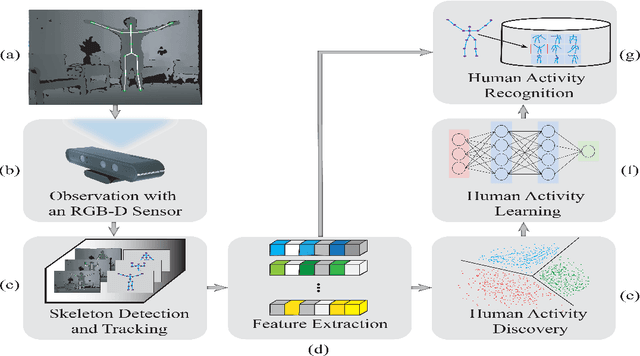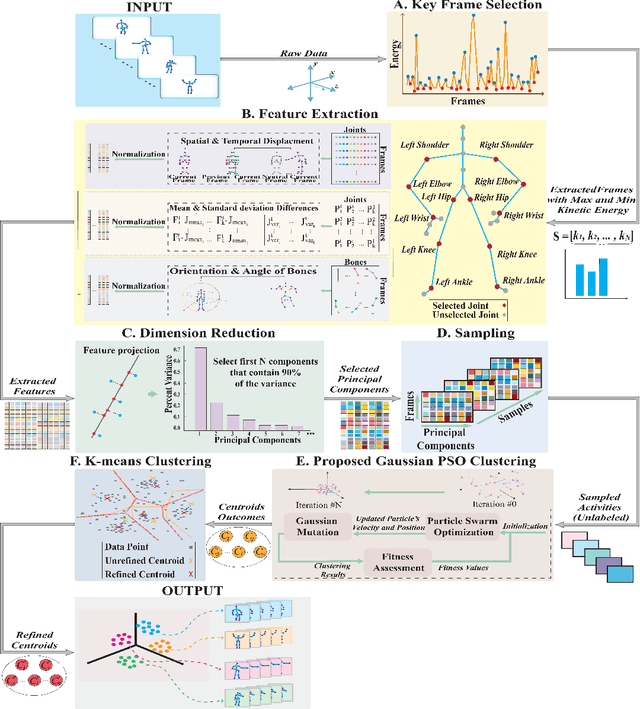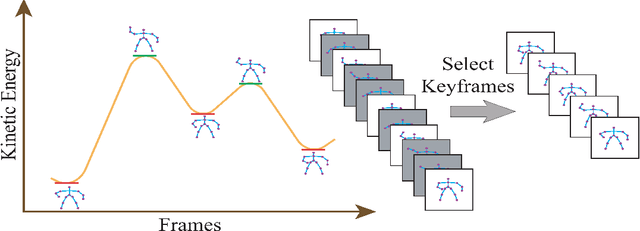Parham Hadikhani
A Novel Skeleton-Based Human Activity Discovery Technique Using Particle Swarm Optimization with Gaussian Mutation
Jan 14, 2022



Abstract:Human activity discovery aims to distinguish the activities performed by humans, without any prior information of what defines each activity. Most methods presented in human activity recognition are supervised, where there are labeled inputs to train the system. In reality, it is difficult to label data because of its huge volume and the variety of activities performed by humans. In this paper, a novel unsupervised approach is proposed to perform human activity discovery in 3D skeleton sequences. First, important frames are selected based on kinetic energy. Next, the displacement of joints, set of statistical, angles, and orientation features are extracted to represent the activities information. Since not all extracted features have useful information, the dimension of features is reduced using PCA. Most human activity discovery proposed are not fully unsupervised. They use pre-segmented videos before categorizing activities. To deal with this, we used the fragmented sliding time window method to segment the time series of activities with some overlapping. Then, activities are discovered by a novel hybrid particle swarm optimization with a Gaussian mutation algorithm to avoid getting stuck in the local optimum. Finally, k-means is applied to the outcome centroids to overcome the slow rate of PSO. Experiments on three datasets have been presented and the results show the proposed method has superior performance in discovering activities in all evaluation parameters compared to the other state-of-the-art methods and has increased accuracy of at least 4 % on average. The code is available here: https://github.com/parhamhadikhani/Human-Activity-Discovery-HPGMK
An adaptive hybrid algorithm for social networks to choose groups with independent members
Oct 04, 2019



Abstract:Choosing a committee with independent members in social networks can be named as a problem in group selection and independence in the committee is considered as the main criterion of this selection. Independence is calculated based on the social distance between group members. Although there are many solutions to solve the problem of group selection in social networks, such as selection of the target set or community detection, just one solution has been proposed to choose committee members based on their independence as a measure of group performance. In this paper, a new adaptive hybrid algorithm is proposed to select the best committee members to maximize the independence of the committees. This algorithm is a combination of particle swarm optimization (PSO) algorithm with two local search algorithms. The goal of this work is to combine exploration and exploitation to improve the efficiency of the proposed algorithm and obtain the optimal solution. Additionally, to combine local search algorithms with particle swarm optimization, an effective selection mechanism is used to select a suitable local search algorithm to combine with particle swarm optimization during the search process. The results of experimental simulation are compared with the well-known and successful metaheuristic algorithms. This comparison shows that the proposed method improves the group independence by at least 21%.
 Add to Chrome
Add to Chrome Add to Firefox
Add to Firefox Add to Edge
Add to Edge